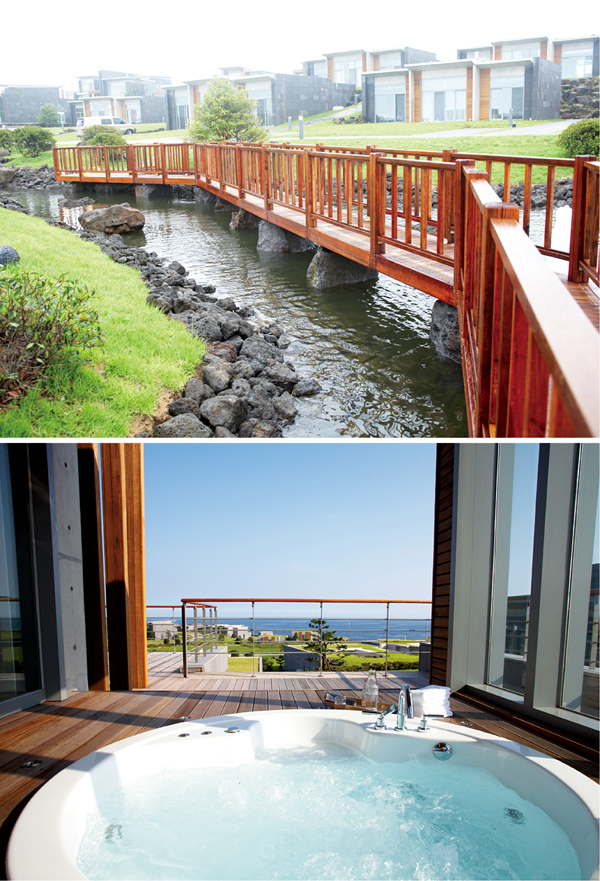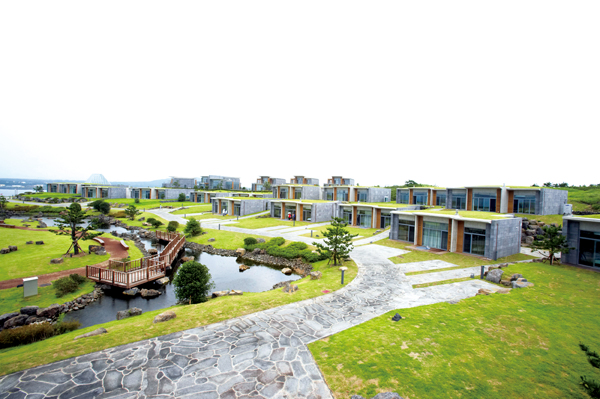
- Updated 2024.5.16 16:06
- All Articles
-
member
icon
-
facebook
cursor
-
twitter
cursor
| |
 |
|
| ▲ Chinese multi-millionaires have recently acquired two of the 50 top private mansions of Phoenix Island Resort, pictured here. “They were much pickier than Korean buyers in choosing their second homes, paying extra care in terms of cardinal directions of the house,” a Resort representative said. Photo courtesy Phoenix Island Resort |
By now, a hotel and scores of private mansions should have been going up in the Eastern corner of the sprawling complex of Phoenix Island Resort. The Resort finished the first phase of its construction, with the grand opening on June 20, 2008, and was about to start the second phase expansion when the global financial crisis hit Korea’s property market.
Financing for the planned luxury hotel was put on hold for an indefinite period, and only 80 percent of some 50 completed private mansions were sold over two years. Then a glimmer of hope came from the Jeju provincial government in the form of permanent residency for foreign investors who buy Jeju property valued at over half a million dollars.
So far, Raon Private Town has enjoyed the greater share of the media limelight regarding the island’s run for new Chinese money. Raon completed three rounds of investor road shows last year, attracting some 53.65 billion won ($47.8 million) worth of provisional contracts with Chinese investors since May 2010. Raon reportedly unloaded nearly its entire inventory after the road shows.
Ironically, though, the first F2 visa was issued not to a Raon customer but to the two Chinese multi-millionaires who have recently completed the acquisition of top properties in the Phoenix Island Resort.
“That is because our properties were up and running already when they visited the Resort to shop for their second home,” Kang Yoon Seong, who is in charge of the property sales in the Resort, told The Jeju Weekly.
If the two new owners settle into Korean society and have no run-ins with the law in the next five years, they will be offered permanent residency from the Korean immigration office.
Kang warned, however, that the visa is simply one of many factors for Chinese buyers to consider when deciding to purchase here, though “permanent residency is a certainly a help for our sales to the foreign buyers.”
| |
 |
|
| ▲ Photo courtesy Phoenix Island Resort |
In fact, chances are those Chinese super-rich may have already acquired US or Canadian green cards. So what are more compelling reasons for wealthy Chinese to flock to the island?
“Jeju beats Hainan Island in all key criteria of the comparison test: it is safer, much nearer [to] key Chinese cities, and less expensive,” Kang summed up. Luxury second homes in Jeju cost about 20,000 yuan (3.4 million won) per square meter, whereas comparable homes on Hainan Island, China’s equivalent to Jeju Island, easily fetch 30,000 yuan per square meter.
The asking price of second homes on Hainan Island is rising fast as speculative investors from the mainland continue to buy luxury properties. Furthermore, it takes less than two hours to fly from Shanghai, Beijing, and the other major Chinese cities to Jeju whereas it takes more than four hours to get to Hainan from the mainland. This makes Jeju an increasingly less expensive and more accessible alternative to China’s own holiday destination.
And due to the negative side effect of the unbridled property development there, local society is being destabilized with an influx of very rich buyers and very poor builders and laborers from other parts of the country. Thus the crime rate in Hainan Island is reportedly rising fast, Kang noted.
Kang confessed that the Resort was not initially prepared to handle the sudden spike of interest by Chinese in the island’s property market. The resort’s esoteric buildings, designed by star architects like Mario Botta and Tadao Ando, have been drawing the attention of Chinese customers.
As the resort is still studying the market potential and testing the water, the best way to attract Chinese in the future would be to partner with Chinese developers, Kang said. Chinese developers will market the property and raise funds in the mainland, for example, before the construction in Jeju starts. The resort is in talks with three major developers from China, confirmed Kim Jin Ah, the resort’s communication officer.
Kang has one useful tip for Jeju developers striving to attract wealthy Chinese: Feng Shui. Chinese buyers pay extra care in terms of cardinal directions of the house before they make a final decision. In fact, they were much pickier than Korean buyers in choosing their second home, Kang said.
And learn to love the color red. Chinese love colorful interiors, and if the primary color of the luxury second home on offer is red, you might well score the final contract.
|
|
|
|
|
|
|
|
ⓒ Jeju Weekly 2009 (http://www.jejuweekly.net)
All materials on this site are protected under the Korean Copyright Law and may not be reproduced, distributed, transmitted, displayed, published without the prior consent of Jeju Weekly. |
|
|
|
|
| Jeju-Asia's No.1 for Cruise |
|
|
|
Title:The jeju Weekly(제주위클리) | Mail to editor@jejuweekly.net | Phone: +82-64-724-7776 Fax: +82-64-724-7796
#503, 36-1, Seogwang-ro, Jeju-si, Jeju-do, Korea, 63148
Registration Number: Jeju, Ah01158(제주,아01158) | Date of Registration: November 10,2022 | Publisher&Editor : Hee Tak Ko | Youth policy: Hee Tak Ko
Copyright ⓒ 2009 All materials on this site are protected under the Korean Copyright Law and may not be reproduced, distributed, transmitted, displayed, published
without the prior consent of jeju weekly.com.

|





















